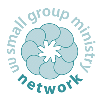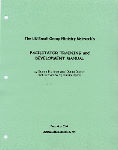Editor's Note: At my request, Helen and Kathy answered the four questions I've been posing about ministry objectives or goals. Their answers describe the experience at their congregation, the Unitarian Universalist Community Church in Augusta, Maine.
(1) Why did your church start its program? What were the goals? The idea of "doing church" in a different way became an intentional part of life in the Northeast District (Maine and Eastern Provinces) in 1997. The District minister, Rev. Glenn Turner, asked the ministers as a group to study the work of Christian evangelicals around the concept of the church growth. There were presentations and small group ministry sessions at district meetings. In the spring of 1998, Glenn Turner introduced Small Group Ministry to our congregation while leading worship. In the fall he made a persuasive presentation at our All Church Retreat.
From review of the history of our program in one of our early publications, three goals or expectations are evident, although they are not labeled as "goals" per se.
Congregational growth: If you ask people if they would like the church to grow, they would likely agree that it should grow. But when you really press them on it, they would admit that they are comfortable in the church now, and if the congregation grew too big, they are afraid that they would lose the sense of community and connection which they value.
Glenn Turner posed a question this way: "How many people are there around Augusta who might share our view of religion, and who share the values and goals we have in addressing society's needs, and who might want to be a part of a spiritual community?" He asserted that you can be a part of any size congregation, and still belong to a small group whose members know you by name and know your story.
Then Glenn made an observation that became one of our guiding principles. "People come to our congregations seeking intimacy and spiritual growth. And we give them committee meetings and Sunday morning worship. Neither of these adequately meets those needs."
Focus on Ministry. One of the first important decisions we made was the name: Small Group Ministry. We had begun to perceive and more widely express the idea that everyone is called to ministry, maintaining that the call to faith is a call to ministry, whether lay or ordained. We had developed a program of lay Pastoral Ministerial Associates. From the beginning, we envisioned our groups as a way that we could better care for one another. People would be connected at a deeper level than is possible Sunday during the Fellowship Hour, and there would be the opportunity to pursue some of the deeper spiritual questions which in our lives we so rarely take time for. But these groups would also form the framework in which we could reach out to one another in caring and support, where we could be present in each others lives in the forms that describe ministry.
Congregational Involvement. In addition to actively keeping the congregation informed throughout the organizational process, we intentionally built Small Group Ministry as a program of the congregation. We shaped our work to the formal structure of the church, involving church leadership in the organizational phases. We brought an initial and then a final proposal to the Board, asking that the Small Group Ministry Program be formally endorsed by the Board and reporting that action out to the congregation. Added to this was the expectation that the groups do a service project for the congregation at least annually.
(2) Were those goals fulfilled? It is interesting to look at these expectations 12 years later. Congregational growth: We had not grown sustainably for a number of years for a variety of reasons, but are experiencing rapid growth this year. Small Group Ministry is a major factor in drawing people further into the fabric of the church community and to sustaining membership. And groups and sessions are expanding to allow variation that connects more people: Open Sessions related to the service on a specific Sunday of the month, the start of a men's group, sessions being developed around other things that are going on in the congregation (developing a ministry on aging, later and end of life issues, goddess traditions, etc.).
Focus on ministry: Small Group Ministry is vital to the overall ministry of the congregation. We have noticed that one of the first questions asked when we learn of a person or family in a difficult situation is, "Are they in a Small Ministry group?" The ministry, then, is also to support the Group as they minister to their member - another level of caring. We have witnessed connections made between members for additional support outside of the group meetings - phone calls, transportation to attend additional church functions or meet specific needs, e-mails. Increasingly, newer members to the congregation are finding life and spiritual connections that extend beyond the Sunday worship.
Congregational involvement
--Varies - some groups take on special tasks on a regular basis. Example: reception for the upcoming Installation of the minister, specific work projects (painting buildings, work days), fundraisers. This needs to be reinforced in some groups to keep them connected.
--Every group that we have is seen as part of the congregational fabric. Traditionally the groups are organized around times they can meet. However, while we have couples and about half the groups include men and women, men have requested a men-specific [group?], with the same session plans available as any other group, which makes it a small group ministry group of men, rather than a "men's group".
--Small group ministry increasingly has become a vehicle for addressing a number of topics and themes. For example, our intentional welcoming focus the last few months has been on ageism, including two informal discussions and a workshop. As a ministry for older members and elders emerges, open sessions around aging and end of life issues is planned. These session plans developed for specific focuses become part of the body of session plans available to all groups.
(3) Were there other benefits?
--We have used the session format to explore events in our community such as the departure of a minister and the welcoming of a new one, and our involvement with Welcoming Congregations and the No on One [is this correct? I haven't heard of it] campaign (Marriage Equality).
--We have also found that the people seem to listen and speak more compassionately at larger gatherings, and attribute this to the practice as part of Small Group Ministry.
(4) What would you say are the main reasons for having the program now, or main benefits, etc?
It is as fundamental to our sense of ourselves as Religious Exploration. It is a major part of how we 'do church' It has cemented many friendships. Along with the Sangha (meditation) and NVC (Nonviolent Communication), it is fundamental to our learning to listen and hear one another and has contributed to getting us through some difficult times. Some of our 'needs extra care' folks have found a place to belong in the community and have become less disruptive. It has given us a solid reputation in the District and the UUA. Well over half our members have been group members at one time or another. As our worship style continues to evolve and the membership changes, there will be ongoing connections to provide continuity.








